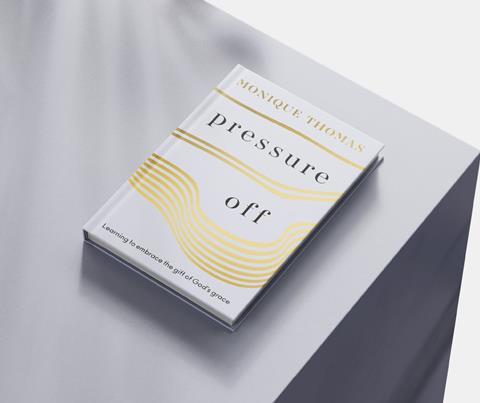Woman Alive editor, Tola-Doll Fisher, spoke to Monique Thomas about her debut book Pressure Off and the important messages she has for women in the Church.

TDF: So why did you write Pressure Off (SPCK)?
MT: In my own life, I’ve experienced an incongruence whereby it’s felt like the Jesus I’m reading about and that I’ve grown to love doesn’t seem to translate easily to my Christian experience. One of the first things I ask in the book is: “When was the last time you were able to breathe?” Our Christian life is not in isolation from our life holistically. My Christian experience can’t just make sense in church, it’s got to make sense everywhere else. I hope these thoughts, reflections and conversations will be an encouragement to anyone else who is also trying to connect the dots between their faith and their reality.
TDF: Your book is separated into chapters including perfection, productivity, singleness, family life and prosperity. How you did you choose those sections to focus on?
MT: What was really important was the connection to my personal life story – so my lived experiences and also what was real in the conversations I was having with friends. You don’t actually have to look too hard to identify them. So, it was thinking about what feels real to me, what feels real to the lives of people that I’m talking to, and then what I’m seeing in the world around me.
TDF: Looking at the list, it does feel quite intuitive, even though I can’t relate to them all. However, what did strike a chord with me is this idea of hyper-productivity and the kind of strong, black woman rhetoric you mention, which was definitely present in my household. What was your experience of that growing up?
MT: My nan came over as part of the Windrush generation and I mention her in the book – she’s 92 now and she’s phenomenal. She came over here seeking a better future, started working in a factory and then moved on to work with the newly formed NHS. She experienced so much discrimination, but what is quite striking is that she had six children. She was working 60-hour weeks at a time when there were no dishwashers, no washing machines and a lot of manual labour in the home that was physically demanding, not just time-consuming. She was the one that held the family together. My nan was a doer because she didn’t have any other option.
My mum is the oldest of her six siblings and, in many ways, she adopted those same patterns. She had three children and she and my dad split up when I was five. I remember being in primary school, and being asked what my parents did for work. I said: “My mum’s got three jobs” – I thought she was such a boss! She was working around the clock to provide for us all and she did a brilliant job of that. But it didn’t come without a cost.
Later, when mum became born again, I believe there was a shift in her Christian experience – as there was in mine when I also became a Christian. But the examples I received from my mum and grandmother were very, very strong. And these things about being strong were in conflict, in some way, with what I felt like I was reading from the Bible. It wasn’t an easy conflict to resolve because I grew up in the Destiny’s Child independent woman era with Spice Girls and TLC, and then I’ve grown around strong independent women who, you know: “Don’t need a man!”
TDF: Were there obvious examples of that conflict in your own life?
MT: I felt guilty about not working around the clock when I had the kids, which sounds a bit strange really. But I struggled to receive help from my husband Eric, because he could provide for us so that I could be at home with the kids more. Everything in me wanted to push against it, and I felt guilty. I’d hear things like: “Make sure you keep a bank account to yourself, just in case!” And I felt like I was being disloyal to this history, this legacy.
My nan will still say to me: “Make sure you do things for yourself, Monique, you can’t depend on people.” That was her survival, whereas I’m trying to carve out something new as a child of God. So, there’s a conflict sometimes and it takes work to undo it. You’ve got to understand the stories that you’re telling yourself, so that you can begin to really unpick some of the stuff that is deeply rooted.

TDF: These things do run deep. And this idea of busyness is also a wider church issue where women are celebrated for doing the Sunday school, focus groups, welcome team, teas and coffees etc. Where do you think that comes from?
MT: I definitely think it depends on the church that you go to. In my experience there is sometimes a disparity between teachings about doing for the Lord versus rest. There has been maybe an overemphasis on doing great exploits, in comparison to taking Sabbath. Subconsciously, what happens, I think, is that we end up equating busyness and doing more with the Christian life; this is what a good Christian life looks like.
As you said, I’m celebrated for being on the welcome team, but am I celebrated for resting and taking the day off? I will also say that there is also some challenge around the way that we view the body and our relationship to it. This idea that as long as it’s kind of bringing glory to God, it doesn’t matter what’s happening in the physical, so I can run myself into the ground, so long as there’s going to be a shadow of Hallelujah, at the end of it, you know; so long as God’s gonna get the glory.
TDF: Something else you mention in your book is female independence not being championed in the Church. You suggested that maybe it was more manpower than girl power. Do we need more girl power in the Church? What would that look like?
MT: Yes, is my answer to that! I think there can be a bit of a resistance to the language of ‘girl power’, perhaps because of how it has been viewed in the world. Outside of the Church, people might feel like this is about slating men – like it’s viewed as a very negative thing. I think we have to find language to talk about things that are problematic and difficult. It would be amazing if, in the Church, we can find our own language to talk about things, but sometimes we just don’t have it. And so, with this, we’re borrowing language that doesn’t necessarily help us to articulate fully what we’re trying to say. For me, it’s important for women to have a voice.
Representation matters. I need to be able to see myself in leadership. We need to see women who can stand in their femininity, and all of who they are, and still lead. I think it’s important that we’re able to call out things that are not right. There are so many examples of sexual misconduct in the Church. It’s that laddish culture, even in some church circles, which is just not acceptable. Women having a voice and speaking to those situations is really, really important.
TDF: Back to the title of your book, Pressure Off. Is there such thing as good pressure?
MT: Of course! If my child is running to touch a fire, I’m going to shout and say: “Get away from there!” I’m going to drag them away and they’re going to feel the pressure of my hand on their back. So, pressure is not always a bad thing. I use the quote in the book: “Pressure bursts pipes, but it also produces diamonds.” What’s really important is first to understand the difference between the two [good pressure and bad pressure]. We need to ask ourselves some questions to help us discern what’s going on for us in any given moment, and I think it helps to look at the fruits.
Ultimately, yes, the book is called Pressure Off, and I want people to feel it. I really want people to be able to breathe, and step back, and ultimately love themselves, each other and love God without living in the ‘shoulds’, like “I should be ashamed” etc. That causes disconnection; it breaks the connection with God, and it breaks the connection with each other.
There are times when the pressure is on, and it has to be on because we are called to pick up our cross and follow Jesus. There is a responsibility attached to our Christian life. We can’t live however we like. But it’s good pressure because the Lord is always leading us, and taking us from glory to glory. His plans are so good and so we know that when the pressure’s on by his leading, there will be a good outcome.
Monique Thomas is a singer-songwriter, podcaster and business owner. She has performed at various festivals including Big Church Day Out and New Wine and featured on Premier Gospel, Smooth Radio, BBC 1 Xtra and BBC Radio 2. Pressure Off – Learning to embrace the gift of God’s grace (SPCK), available from 17 August, is her first book.
































No comments yet